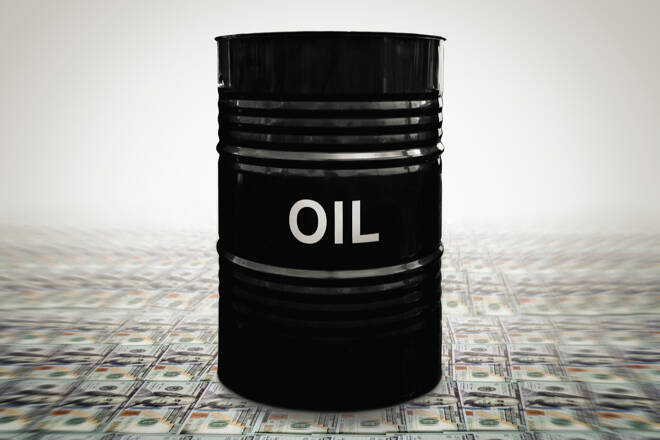Advertisement
Advertisement
Oil News: Crude Prices Slide as Saudi Arabia Eyes October Price Cuts
By:
Key Points:
- Saudi Arabia may cut October oil prices for Asia by 50-70 cents per barrel, reflecting weaker demand and refining margins.
- U.S. crude oil futures hit $72.89 amid concerns over OPEC+ production increases and sluggish demand from China and the U.S.
- OPEC+ plans to boost output by 180,000 barrels/day in October, raising fears of further price pressure on crude oil markets.
- Analysts predict OPEC may delay ending voluntary cuts to stabilize prices as demand concerns grow in China and the U.S.
Oil Prices Decline as Saudi Arabia Considers Price Cuts and OPEC+ Output Rises
U.S. crude oil futures continued their slide on Monday as the market reacted to potential price cuts by Saudi Arabia and an anticipated increase in OPEC+ production. Light Crude Oil futures dropped to $72.89 at 02:30 GMT, briefly testing August lows before recovering slightly to $73.91 by 09:00 GMT. These declines come amid concerns over sluggish demand from China and the U.S., the world’s two largest oil consumers, and follow last week’s losses, with Brent crude falling 0.3% and WTI dropping 1.7%.
At 10:23 GMT, Light Crude Oil Futures are trading $73.37, down $0.18 or -0.24%.
Saudi Arabia Considers Price Cuts for Asia
Saudi Arabia, the world’s top oil exporter, is expected to lower its crude oil prices for Asia in October. Market sources anticipate a reduction of 50 to 70 cents per barrel for its flagship Arab Light crude, driven by a recent slump in the Middle East benchmark Dubai prices. This move reflects weakening refining margins, particularly in China, where economic struggles in the manufacturing and property sectors are dampening fuel demand. Analysts are cautious about the market’s performance in September, typically a strong month for oil demand, suggesting that it may fall short of expectations this year.
While some expect significant price cuts, others believe the October Official Selling Price (OSP) for Arab Light may remain stable, citing a slight recovery in Dubai prices towards the end of last month. For heavier Saudi grades like Arab Medium and Arab Heavy, a more modest price reduction is anticipated, supported by ongoing demand for fuel oil.
OPEC+ Supply Increases Set for October
OPEC+ is scheduled to increase oil production in October as part of a gradual easing of previous output cuts. Eight members of the group are set to boost production by 180,000 barrels per day, as they begin to unwind the 2.2 million barrels per day cuts introduced earlier. This increase raises concerns that higher output could exert additional pressure on prices, especially if WTI crude remains closer to $70 per barrel rather than $80. Market analysts suggest that the actual impact on prices will depend on how well these production increases match the prevailing market demand.
Libya Resumes Domestic Oil Production
In Libya, the Arabian Gulf Oil Company has resumed production at a rate of up to 120,000 barrels per day, primarily for domestic needs. However, exports remain halted due to a standoff between rival factions that previously shut down most of the country’s oilfields. Despite this resumption, the overall market sentiment remains bearish, with both Brent and WTI crude experiencing consecutive monthly losses.
Market Outlook: Bearish Sentiment Prevails
The outlook for crude oil prices remains bearish in the short term. China’s manufacturing activity dropped to a six-month low in August, heightening concerns about the country’s economic growth and its impact on global oil demand. Meanwhile, in the U.S., oil consumption has slowed to its lowest seasonal levels since the pandemic, further weighing on prices. Analysts from ANZ warn that economic pressures in both China and the U.S. may compel OPEC to reconsider its planned production increases, potentially delaying the phase-out of voluntary cuts to stabilize prices.
Given these factors, traders should prepare for continued volatility, with the potential for further price declines if demand does not improve or if OPEC+ proceeds with its output hikes.
Technical Analysis
Light crude oil futures are lower, while straddling a key 50% level at $73.43. Sellers could hit the market hard if this label is taken out convincingly. Potential downside targets include a pair of main bottoms at $71.46 and $70.50 as well as a Fibonacci level at $71.02.
From a longer-term perspective, the $73.43 to $71.02 retracement zone or value zone could be the most important support on the chart.
On the upside, recovering the 200-day moving average at $74.29 will alleviate some of the downside pressure.
About the Author
James Hyerczykauthor
James Hyerczyk is a U.S. based seasoned technical analyst and educator with over 40 years of experience in market analysis and trading, specializing in chart patterns and price movement. He is the author of two books on technical analysis and has a background in both futures and stock markets.
Advertisement
